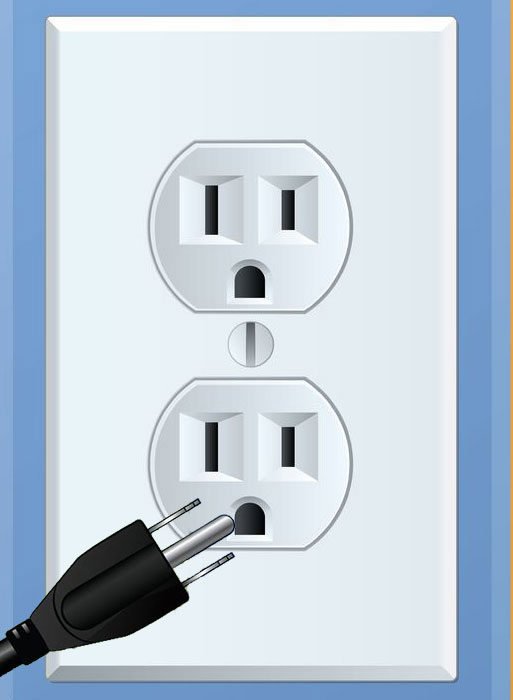Using Extension Cords vs
Having Enough Receptacles
When it comes to extension cord safety, there are things you should do and there are things to avoid.
Extension cords are pretty common and easy to get when you need to get power to your electrical appliances. But if not used safely, they can create fire hazards endanger your personal safety.
If you’re going to use an extension cord, follow these simple safety tips:
• It’s best to know the amperage of what you will be plugging into the extension cord to make sure that it doesn’t become overloaded. A 14 gauge cord will allow 12 Amps of continuous use, and a 12 gauge cord will allow 16 Amps of continuous use.
• Get a cord that’s the right length. and stick to the trade length. Daisy chaining several cords together to power something far away will likely overload the capability of the cord.
• A simple rule to follow is to use small electrical cords only for lamps and and radios, etc. If you’re going to power a microwave, toaster oven, clothes washer, or a refrigerator, it’s best to use a 12 gauge extension cord that’s rated for a heavy duty load.
 • One rule of thumb for safety is to only Power one appliance for each cord. Once you start powering multiple appliances at the same time you run the risk of overloading the cord.
• One rule of thumb for safety is to only Power one appliance for each cord. Once you start powering multiple appliances at the same time you run the risk of overloading the cord.
• One way to tell if you are overloading the cord is if it gets too hot. If you touch the cord and you feel that it is very warm or hot you should discontinue the use of the cord until you can figure out why it’s too hot. The problem is probably that you have an appliance with too much amperage, or you have too many appliances plugged into the cord.
• If you run an extension cord under anything like a rug, or furniture, you run the risk of the cord inadvertently becoming damaged when somebody replaces something heavy on top of the cord, because they don’t know it’s there..
• Taping a cord to the ground is risky because you’re hiding the surface of the cord from eyesight making it possible for a damaged cord not to be recognized. Also, hanging the cord or draping from nails, screws, etc., is also putting undue stress on the cord. It is best to run the cord in open air, in plain sight, and uncovered..
• The wires inside of the cord can be damaged if you bend the cord too much. Make sure to use sweeping bends in the cord and not pinch the cord, or bend the cord too tight. This could damage the wires inside.
• Always use a cord with a ground. Ungrounded cords invite potential hazards of electrocution.
• Sometimes it’s tempting to cut off the ground prong to plug in extension cord into a receptacle with only two blades, but this removes the grounding potential of the extension cord and creates a potential electrocution hazard. Always maintain an extension cord in its original condition.
• Make sure to use a cord that you can trust form your local hardware store.
• Don’t use a cord outdoors, unless it’s rated for using outdoors.
In order to protect your extension cords always:
- If a cord is damaged, throw it away.
- Always keep cords dry and indoors.
- Unplug extension cords when they’re not in use
- When unplugging an extension cord, pull the plug, not the cord.
- Extension cords are for temporary use. If you find you’re using them on a permanent basis, consider updating your home’s electrical system.


